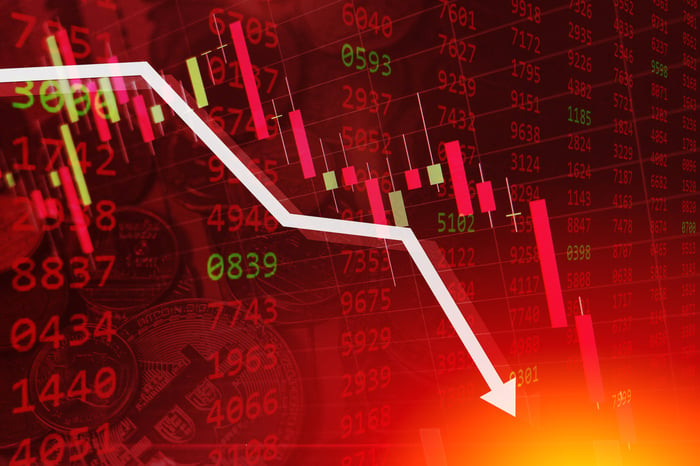Though there's been talk of a COVID-19-spurred massive recession for months, and unemployment levels have been high enough to indicate that our country was in the midst of one, an official recession had yet to be declared -- until now. On Monday, economists from the National Bureau of Economic Research stated that the U.S. economy actually entered a recession in February.
On one hand, this news isn't shocking. Both April and May saw double-digit unemployment, while gross domestic product fell nearly 5% in the first quarter of 2020. And while we don't have second-quarter numbers yet, forecasters expect them to be pretty dire.
Compounding the problem is the potential for a second wave of COVID-19 cases to hit later this year, thereby canceling out any recovery we might see in the near term as states begin to reopen. If you're worried about managing your money during a recession, or losing your job, here are a few important moves to make immediately.

Image source: Getty Images.
1. Build or boost your emergency fund
Jobs tend to get lost during a recession, so even if you're working today, if things get worse, you may find yourself unemployed. And while you should, at that point, be entitled to unemployment benefits, you may find that they only replace a fraction of your former paycheck. That's why it's crucial to bank some emergency savings -- in case you do lose your job, experience a loss of income, and remain unemployed for quite some time.
During normal periods, you'll hear that three to six months' worth of living expenses in the bank should suffice and offer solid protection. But because we're in the middle of not only a recession, but also, a pandemic, you'd be wise to aim for the higher end of that range, or even a bit beyond. Furthermore, while there's nothing wrong with investing during a recession -- it can be a smart move, in fact -- your emergency savings should not be tied up in stocks, but rather, tucked away securely in a bank account, where your balance won't be subject to fluctuations based on market conditions.
2. Pay off high-interest debt
Owing money to a credit card company can be a burden at any time. During a period of unemployment, it can be horrendous. While you're not guaranteed to lose your job in a recession, it's important to prepare for that possibility, and so paying off costly debt while you're still working is a good way to alleviate potential stress in the event of a loss of income.
Now to be clear, you don't have to scramble to pay off healthy debt right now, like your mortgage. Rather, focus on debts that not only cost you a lot in interest, but have the potential to wreck your credit score, like credit card balances.
3. Rethink your spending on a whole
If you're still working, have a solid emergency fund, and don't have any unhealthy debt, then you may not need to start slashing expenses right away. At the same time, it pays to put some thought into the expenses you can cut if your income were to take a hit. Think about the things you spend money on and identify those you can live without. You may find that you really don't need that $60-a-month gym membership (especially if you're limited to online classes now anyway), or that you can cancel the $40 subscription box you receive every month that's nice to have, but certainly not essential. Making these decisions now will help you better manage your money if you do lose your job.
4. Secure a home equity line of credit
If your job goes away in the coming months, things may stay that way for a while. That's why it helps to have an affordable borrowing source at your disposal, and your home may be just that. In fact, it pays to apply for a home equity line of credit, because that way, you're not borrowing money immediately that you may not need and racking up interest on it. Rather, you're simply securing a line of credit that you can draw from should the need arise.
5. Keep investing
You might think that investing during a recession is a terrible idea, but actually, the opposite is true. Recessions often equate to lower stock values, which means you have a solid opportunity to load up on quality investments at a discount.
If you're going to invest, though, you'll need to follow a few ground rules. First, make sure you have the ability to leave your portfolio alone for a good seven to 10 years. You should never invest money you expect to need in the near term. Next, don't expect to make a quick profit; buy up quality stocks with the goal of holding them for the long run. Finally, have a strategy. Don't just pick random stocks; research the companies you're looking to invest in, make sure you understand their business models, and aim for a diverse mix.
Like it or not, we're in our first recession in more than a decade. Rather than get worked up over that official declaration, take steps to improve your financial picture so that if things do take a turn for the worse on a personal level, you'll be in a strong position to ride out the storm.




